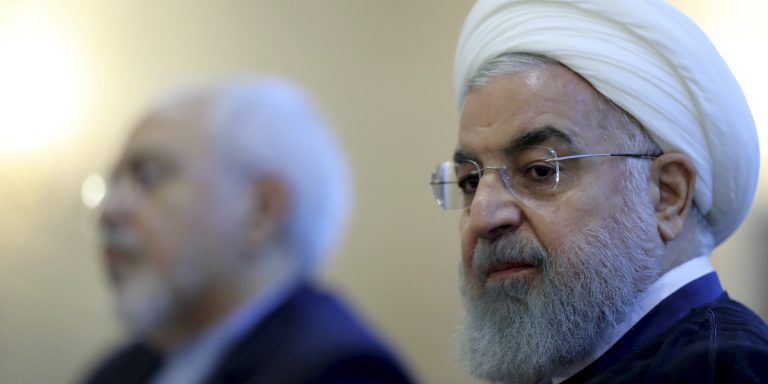INTELBRIEF
July 26, 2018
IntelBrief: Iran Policy Turns More Aggressive

- The Trump administration is responding to Iran’s threats of military action in order to rally international support for a more aggressive posture against Iran.
- Threats against the United States by moderate President Hassan Rouhani suggest that Rouhani is facing domestic hardliner pressure as a result of the U.S. exit from the 2015 Iran nuclear agreement.
- The Trump administration seeks to portray Iran as weak, but does not intend to become embroiled in actual military conflict with Tehran.
- Secretary of State Pompeo’s July 22 recitation of a litany of Iranian human rights abuses signals U.S. support for a change of Iran’s regime.
.
President Trump’s July 23, 2018 all capitals tweet that Iran would ‘suffer the consequences the likes of which few throughout history have ever suffered before’ if it again threatened military action against the United States reflects a turn toward a more aggressive U.S. Iran policy. The President’s tweet came one day after Iranian President Hassan Rouhani, a moderate, threatened “the mother of all war” against the United States. The trading of threats comes two weeks before the first set of U.S. sanctions go back into effect following the May 8, 2018 Trump Administration exit from the 2015 Iran nuclear deal. U.S. officials are insisting that, by November 4, 2018—that date is the anniversary of the 1979 Iranian seizure of the U.S. Embassy in Tehran—Iran’s major oil customers cut their imports of Iranian oil entirely. Iran’s leaders earlier threatened to close the strategic Strait of Hormuz, through which nearly 40% of the world’s traded oil flows, if Iran’s oil exports are halted by the U.S. sanctions.
Iran’s threats reflect President Rouhani’s need to shore up his position on his signature initiative following the U.S. exit from the deal. Hardliners in Iran have attacked Rouhani for trusting the United States to uphold the deal. President Trump’s counter-threats serve numerous purposes: shifting the U.S. discussion from U.S. relations with Russia; portraying Iran as strategically weak and unable to match the United States militarily; and building international cooperation with the re-imposition of U.S. sanctions on Iran’s economic sectors. President Trump and his aides are trying to persuade the other parties to the nuclear deal, particular the European countries, all of whom want to continue implementing the agreement, to cease providing Iran with the economic benefits of the accord. Highlighting Iranian threats serves that policy interest.
Yet, despite the shrillness of President Trump’s tweet, his administration does not seek actual hostilities with Iran. Military action against Iran would contradict the thrust of President Trump’s overall regional policy, which has been to extricate the United States from the region and not become embroiled in any new major conflicts. While the rhetoric has ramped up, there are no evident new U.S. military moves in or around the Strait of Hormuz that would suggest U.S.-Iran hostilities are imminent.
Whereas the Trump administration does not seek military clashes with Iran, there are indications it is moving more toward a policy of regime change. It has been a constant theme of statements by President Trump and the U.S. Secretary of State since mid-2017 that the United States supports the Iranian people and that the regime spends its funds supporting regional militant factions such as Hezbollah rather than serving the interests of its people. President Trump enthusiastically supported recent protests in Iran, and he sees U.S. sanctions as likely to stoke further unrest. On July 22, Secretary of State Mike Pompeo gave a major speech to 1,000 Iranian-Americans at the Reagan Library in California in which he accused the regime of corruption, human rights abuses, and ignoring public aspirations. He also announced new U.S. broadcasting into Iran. Pompeo’s speech, coupled with President Trump’s tweet, clearly indicate movement to challenge Iran’s regime with all elements of U.S. national power.
.
For tailored research and analysis, please contact: info@thesoufancenter.org
[video width="960" height="540" mp4="https://thesoufancenter.org/wp-content/uploads/2018/07/IB-0726.mp4" poster="https://thesoufancenter.org/wp-content/uploads/2018/07/AP_18203372909688.jpg"][/video]